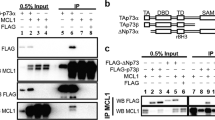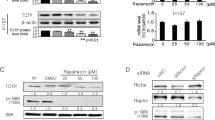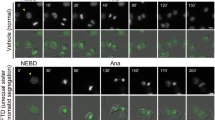Abstract
Cancer chemotherapeutic agents such as cisplatin exert their cytotoxic effect by inducing DNA damage and activating programmed cell death (apoptosis). The tumour-suppressor protein p53 is an important activator of apoptosis. Although p53-deficient cancer cells are less responsive to chemotherapy, their resistance is not complete, which suggests that other apoptotic pathways may exist. A p53 -related gene, p73, which encodes several proteins as a result of alternative splicing1,2, can also induce apoptosis3. Here we show that the amount of p73 protein in the cell is increased by cisplatin. This induction of p73 is not seen in cells unable to carry out mismatch repair and in which the nuclear enzyme c-Abl tyrosine kinase is not activated by cisplatin. The half-life of p73 is prolonged by cisplatin and by co-expression with c-Abl tyrosine kinase; the apoptosis-inducing function of p73 is also enhanced by the c-Abl kinase. Mouse embryo fibroblasts deficient in mismatch repair or in c-Abl do not upregulate p73 and are more resistant to killing by cisplatin. Our results indicate that c-Abl and p73 are components of a mismatch-repair-dependent apoptosis pathway which contributes to cisplatin-induced cytotoxicity.
This is a preview of subscription content, access via your institution
Access options
Subscribe to this journal
Receive 51 print issues and online access
$199.00 per year
only $3.90 per issue
Buy this article
- Purchase on SpringerLink
- Instant access to full article PDF
Prices may be subject to local taxes which are calculated during checkout





Similar content being viewed by others
References
Kaghad, M. et al. Monoallelically expressed gene related to p53 at 1-36, a region frequently deleted in neuroblastoma and other human cancers. Cell 90, 809–819 (1997).
De Laurenzi, V. et al. Two new p73 splice variants, gamma and delta, with different transcriptional activity. J. Exp. Med. 188, 1–6 (1998).
Jost, C., Marin, M. & Kaelin, W. p73 is a human p53-related protein that can induce apoptosis. Nature 389, 191–194 (1997).
Drummond, J., Anthoney, A., Brown, R. & Modrich, P. Cisplatin and Adriamycin resistance are associated with MutL-alpha and mismatch repair deficiency in an ovarian cancer cell line. J. Biol. Chem. 271, 19645–19648 (1996).
Fink, D. et al. In vitro and in vivo resistance to cisplatin in cells that have lost DNA mismatch repair. Cancer Res. 57, 1841–1845 (1995).
Buermeyer, A. B., Patten, C. W., Baker, S. M. & Liskay, R. M. The human MLH1 cDNA complements DNA mismatch repair defects in Mlh1-deficient mouse embryonic fibroblasts. Cancer Res. 59, 538–541 (1999).
Toft, N. J. et al. Msh2 status modulates both apoptosis and mutation frequency in the murine small intestine. Proc. Natl Acad. Sci. USA 96, 3911–3915 (1999).
Boyer, J. et al. Microsatellite instability, mismatch repair-deficiency, and genetic defects in human cancer cell lines. Cancer Res. 55, 6063–6070 (1995).
Liu, Z. et al. Three distinct signalling responses by murine fibroblasts to genotoxic stress. Nature 384, 273–276 (1996).
Kharbanda, S. et al. Activation of the c-Abl tyrosine kinase in the stress response to DNA-damaging agents. Nature 376, 785–788 (1995).
Nehme, A. et al. Differential Induction of c-Jun NH2-terminal kinase and c-Abl kinase in DNA mismatch repair-proficient and deficient cells exposed to cisplatin. Cancer Res. 57, 3253–3257 (1997).
Lowe, S. W., Schmitt, E. M., Smith, S. W., Osborne, B. A. & Jacks, T. p53 is required for radiation-induced apoptosis in mouse thymocytes. Nature 362, 847–849 (1993).
Tybulewicz, V. L. J., Crawford, C. E., Jackson, P. K., Bronson, R. T. & Mulligan, R. C. Neonatal lethality and lymphopenia in mice with a homozygous disruption of the c-abl proto-oncogene. Cell 65, 1153–1163 (1991).
Edelmann, W. et al. Meiotic pachytene arrest in MLH1-deficient mice. Cell 85, 1125–1134 (1996).
Nelson, W. G. & Kastan, M. B. DNA strand breaks: the DNA template alterations that trigger p53-dependent DNA damage response pathways. Mol. Cell. Biol. 14, 1815–1823 (1994).
Zamble, D., Jacks, T. & Lippard, S. p53-dependent and -independent responses to cisplatin in mouse testicular teratocarcinoma cells. Proc. Natl Acad. Sci. USA 95, 6163–6168 (1998).
Pear, W. S., Nolan, G. P., Scott, M. L. & Baltimore, D. Production of higher-titer helper-free retrovirus by transient transfection. Proc. Natl Acad. Sci. USA 90, 8392–8396 (1993).
Chen, C. & Okayama, H. High efficiency transformation of mammalian cells by plasmid DNA. Mol. Cell. Biol. 7, 2745–2752 (1987).
Marin, M. et al. Viral oncoproteins discriminate between p53 and the p53 homolog p73. Mol. Cell. Biol. 18, 6316–6324 (1998).
Baskaran, R. et al. Ataxia telangiectasia mutant protein activates c-Abl tyrosine kinase in response to ionizing radiation. Nature 387, 516–519 (1997).
Kalejta, R., Shenk, T. & Beavis, A. Use of a membrane-localized green fluorescent protein allows simultaneous identification of transfected cells and cell cycle analysis by flow cytometry. Cytometry 29, 286–291 (1997).
Nicoletti, I., Migliorati, G., Pagliacci, M. C., Grignani, F. & Riccardi, C. Arapid and simple method for measuring thymocyte apoptosis by propidium iodide staining and flow cytometry. J. Immunol. Meth. 139, 271–279 (1991).
Acknowledgements
We thank I. Hunton for the preparation of p53- and c-Abl-deficient MEFs, R.Kucherlapati and R. Kolodner for the MLH1-deficient MEFs, and R. Kolodner for critically reading the manuscript. This work was supported by grants from AIRC and CNR-PF Biotechnologie (to M.L.) and from the NIH (to J.Y.J.W.).
Author information
Authors and Affiliations
Corresponding author
Rights and permissions
About this article
Cite this article
Gong, J., Costanzo, A., Yang, HQ. et al. The tyrosine kinase c-Abl regulates p73 in apoptotic response to cisplatin-induced DNA damage. Nature 399, 806–809 (1999). https://doi.org/10.1038/21690
Received:
Accepted:
Issue Date:
DOI: https://doi.org/10.1038/21690



